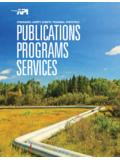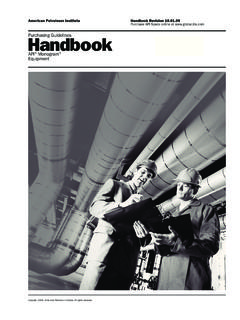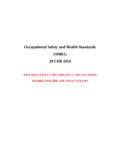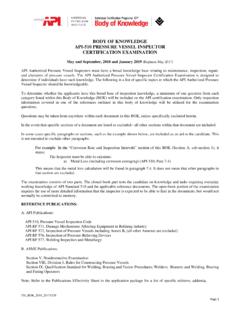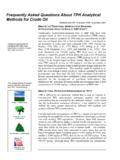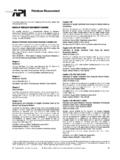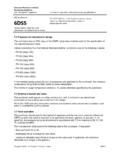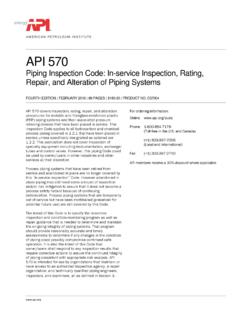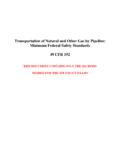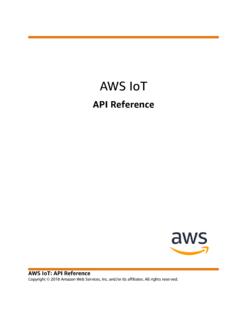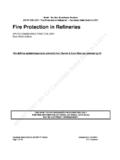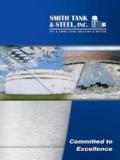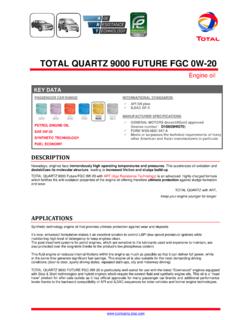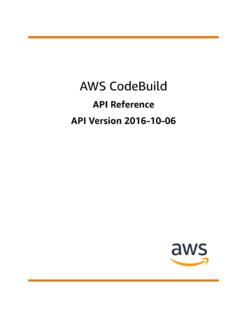Transcription of Total Motor Vehicle Incident Metric - API
1 Revised: September 2017 1 Total Motor Vehicle Incident Metric The following definitions and interpretations were based partially on guidance provided by ANSI 1976, a former standard for recording and measuring Motor Vehicle Incident experience. The intent of these definitions is to capture Vehicle incidents which are deemed within the control of the company to prevent. Scope Motor Vehicle incidents associated with Pipeline and Terminal operations: Licensed company owned, leased, or rented vehicles (employee or contractor drivers) Employee driving a personal Vehicle for business use Exclusions: Vehicle incidents involving crude oil, refined product, or chemicals transport Contractors driving non-company owned, leased or rented vehicles Non-business use of a licensed company owned, leased, or rented Vehicle (employee or contractor drivers).
2 See definition of Business Use of a Vehicle . Definitions Reportable Motor Vehicle Incident A reportable Motor Vehicle Incident is any Incident involving a licensed Motor Vehicle , as defined above, in motion, which results in an OSHA recordable injury, Vehicle damage or other property damage. Who was injured, what property was damaged, the amount of damage, where the Incident occurred (on or off-road), is not a factor. The following Motor Vehicle Incidents are deemed non-preventable by the driver and are therefore, not reportable to API. If however, a company determines through investigation that a particular Incident (of the type listed below) was preventable (driver failed to take reasonable precautions) they must report it to preserve the intent of capturing preventable Vehicle incidents.
3 Properly Parked - The Vehicle was properly parked at the time of the Incident (see Properly Parked Motor Vehicle ) Damage as a result of door or tailgate dings while properly parked is excluded. Animal Strikes - The Vehicle is damaged due to striking or being struck by an animal. Standing in Traffic - At the time of the Vehicle Incident , the Vehicle is stopped in a traffic lane in response to an officer, signal, stop sign, or to traffic conditions. Road Debris, Rocks, Gravel, Tar - Damage caused solely by striking road debris ( potholes, a nail, truck tire tread) as well as rocks or gravel thrown by vehicles, or by getting road tar on the Vehicle . However, if rocks or gravel thrown from the Vehicle causes a subsequent Motor Vehicle Incident causing injury, Vehicle or property damage the Incident is a Motor Vehicle Incident .
4 3rd Party Citations - Vehicle incidents in which the 3rd party receives a citation and the company Vehicle operator does not. Flood, Earthquake, Lightning, Natural Disasters, etc. - Incidents that result in injury, Vehicle or property damage solely as the result of floods, earthquakes, lightning, Revised: September 2017 2 etc., are not Motor Vehicle incidents. However, if a driver enters high water resulting in injury, Vehicle or property damage, the Incident is a Motor Vehicle Incident . Properly Parked Motor Vehicle - A properly parked Motor Vehicle is one that is completely stopped and parked where it is legal to park such a Vehicle or to stop for the purpose of loading or unloading persons or property. Motor Vehicle - A licensed Company-owned Vehicle (COV), employee-owned Vehicle (EOV) on business use, or a Company rented or leased Vehicle .
5 It does not include pieces of equipment operated as vehicles on fixed rails, industrial forklifts, road building machinery, crawler cranes, draglines, farm equipment, or similar equipment. The load ( trailer) on a Motor Vehicle is to be considered a part of the Vehicle , if a Motor Vehicle Incident occurs that involves the load. Business Use of a Vehicle - Business use of a company-owned, leased, or rented Vehicle is applicable to employees and contractors and includes all miles driven, including commuting to and from work, driving to and from a call-out location and going to and from lunch. Business use of a personal Vehicle includes all miles driven which the employee is eligible to be reimbursed for the mileage driven.
6 Total Vehicle Incident Rate The Total Vehicle Incident rate is the number of Motor Vehicle incidents per one million miles driven for business use and is calculated as follows: Total Vehicle Incident Rate = Number of Total Vehicle Incidents x 1,000,000 Business Use Miles Driven Interpretations Motor Vehicle Incident - Any Vehicle or property damage shall be considered in determining a Vehicle Incident , regardless of the amount of damage, cost of the repair or whether the repair is actually made. Incidents involving the use of incidental equipment such as cranes and related equipment mounted on a Motor Vehicle are not to be considered Motor Vehicle incidents unless the Motor Vehicle is a licensed Vehicle being operated as a Motor Vehicle at the time of the Incident .
7 Non- collision Incidents Non-collision incidents such as the upset, rollover, jackknife, or run-off-the-road type incidents that cause injury, Vehicle or property damage are Motor Vehicle incidents. Two Vehicles Same Company - If two vehicles of the same company collide, the Incident is to be considered as two Motor Vehicle incidents unless one of the vehicles was properly parked. Driverless Motor Vehicle (Runaways, Etc.) - Injury, Vehicle or property damages resulting from an Incident caused by a driverless Motor Vehicle in motion are Motor Vehicle incidents. Shifting Cargo (Abrupt Stops, Starts, Turns) - When abnormal driving (fast starts, stops, or excessive speed on turns or over rough roads, detours, etc.) causes the shifting of cargo, Revised: September 2017 3 which results in injury, Vehicle or property damage (other than the cargo), the Incident is a Motor Vehicle Incident .
8 Injury to Pedestrians or Bystanders - Incidents that result in injury to pedestrians or bystanders caused by contact with a moving Vehicle , or an object carried on or set in motion by the Vehicle are Motor Vehicle incidents. Hitching Rides - Incidents that result in injury, Vehicle or property damage caused by persons attempting to hitch rides (hanging on, riding pulled bicycles) on moving vehicles are Motor Vehicle incidents. Persons Falling From Motor Vehicle - Injury, Vehicle or property damage that results from persons falling from moving Motor vehicles are Motor Vehicle incidents. However, if the Vehicle is properly parked, such incidents are not Motor Vehicle incidents. Vehicle Evasive Action If injury, Vehicle or property damage results from an Incident caused by an effort of the driver to evade some person or object, the Incident is a Motor Vehicle Incident .
9 Carbon Monoxide, etc. Incidents that result in death or illness solely because of inhalation of carbon monoxide exhaust gases, etc., are not Motor Vehicle incidents. However, if for example, a driver becomes drowsy from breathing carbon monoxide and the Vehicle then runs off the road and turns over, the Incident would be a Motor Vehicle Incident . Firearms - Incidents that result in injury, Vehicle or property damage solely as the result of the discharge of firearms are not Motor Vehicle incidents. However, if, for example, a bullet strikes a driver and he then loses control of the Vehicle and hits an object, the Incident would be a Motor Vehicle Incident . Established Intent to Injure or Cause Property Damage - Incidents that are established by investigation as being planned by the company driver for the purpose of injuring or causing property damage are Motor Vehicle incidents.
10 Incidents on Private Property - Whether an Incident happens on the public highways or on private property is not a factor. Roadway or Driveway Damage - Damage to a roadway or driveway, on private property, driven over with the owner's consent, caused solely by the weight of the Vehicle is not a Motor Vehicle Incident . If injury, Vehicle or other property damage occurs because, for example, a Vehicle skids or is driven off the driveway, the Incident is a Motor Vehicle Incident . Mechanical Failures - Mechanical failures that result in damage to the failed parts of the Vehicle only (clutch burnout, gear stripping, tire failures, etc.) are not Motor Vehicle incidents. Failures (such as tire or brake failures) that result in incidents that cause injury, further Vehicle damage or property damage are Motor Vehicle incidents.
